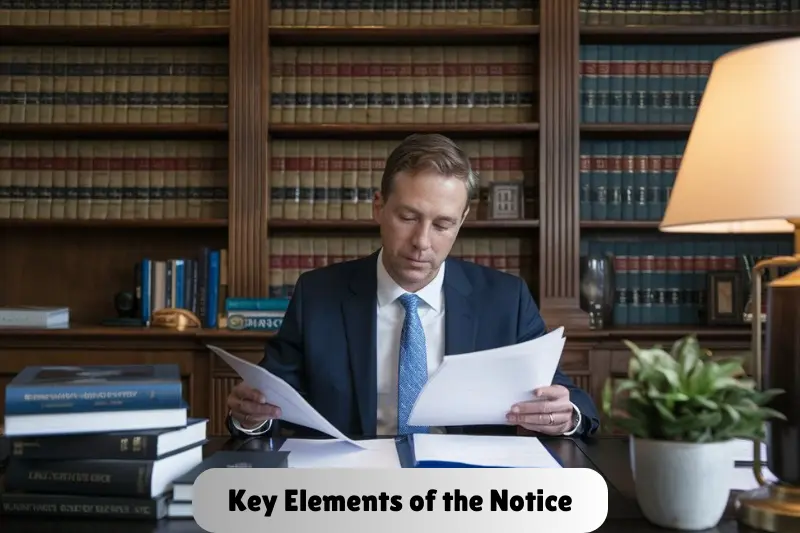Introduction
When it comes to large business deals, such as mergers, acquisitions, or financial transactions, it’s important for all parties involved to be fully aware of any potential legal issues that could arise. This is where a Brook Taube Wells Notice comes in. It’s a formal notification used to alert stakeholders about possible legal concerns before they become bigger problems. Named after the law firms Brook Taube and Wells, this notice helps ensure that everyone involved in a corporate deal is informed and protected. By providing transparency and addressing risks early on, it helps businesses avoid unexpected legal challenges and make more confident decisions.
What is a Brook Taube Wells Notice?

A Brook Taube Wells Notice is a legal notice that is often associated with securities law, particularly in the context of mergers, acquisitions, or other corporate transactions. This notice serves to inform relevant parties about potential legal concerns or issues that may arise from a financial or corporate transaction.
It is named after the law firms Brook Taube and Wells, which are known for their involvement in securities law. The primary purpose of this notice is to ensure that all stakeholders are aware of any possible legal implications before moving forward with the deal. This helps businesses and investors understand the risks involved and take the necessary steps to address potential legal challenges.
You May Also Like It
Trendzguruji.me – Computer, Cyber, Awareness, SEO, Health & Beauty Guide
TrendzGuruji.me Cyber Insights Hub
“What’s Up with Emerald Gems? Let’s Talk
Why is the Brook Taube Wells Notice Important?
The Brook Taube Wells Notice is important for several reasons, particularly in the context of high-stakes corporate transactions. Here’s why it matters:
Prevents Legal Disputes
- The primary function of the notice is to flag potential legal issues early in a transaction. By informing all parties involved of possible concerns, it helps prevent conflicts and disputes down the line, saving both time and money.
Ensures Transparency
- In complex deals such as mergers or acquisitions, transparency is crucial. The notice ensures that all stakeholders—investors, companies, and legal teams—are aware of any potential legal risks or regulatory issues before moving forward. This transparency builds trust and ensures that no party is caught off guard.
Promotes Regulatory Compliance
- The notice ensures that all actions taken during a corporate transaction are in line with relevant legal and regulatory standards. By addressing potential compliance issues early on, it minimizes the risk of violating laws, which can lead to costly penalties or damage to reputation.
Supports Risk Management
- By alerting parties to possible legal hurdles, the Brook Taube Wells Notice helps businesses assess and manage risks more effectively. It allows them to take preventive measures and make informed decisions about how to proceed, reducing the likelihood of unforeseen complications.
Safeguards Investors and Stakeholders
- Investors and other stakeholders rely on the integrity of a transaction. The notice protects their interests by providing them with an early warning about legal concerns, ensuring they can make decisions with a clearer understanding of the risks involved.
Encourages Due Diligence
- The notice plays a vital role in the due diligence process by ensuring that all legal aspects of the deal are carefully reviewed. It encourages thorough examination of the deal’s structure, helping to uncover any issues that could affect the deal’s success or legality.
Prevents Future Legal Challenges
- By addressing potential issues early, the Brook Taube Wells Notice helps reduce the chances of future legal challenges. This forward-thinking approach ensures that any legal concerns are addressed before they escalate, promoting smoother and more successful transactions.
The Background of Brook Taube Wells Notice
The Brook Taube Wells Notice is a legal instrument primarily used in the world of securities law and corporate transactions. The notice is named after the law firms Brook Taube and Wells, which have played significant roles in advising companies and investors on complex financial deals. These firms became well-known for their expertise in addressing legal concerns surrounding mergers, acquisitions, and securities transactions.
The concept behind the notice emerged as a way to promote transparency and risk management in corporate transactions. In high-stakes deals like mergers or large-scale financial transactions, there are often many potential legal and regulatory issues that can arise. Without proper legal safeguards, these issues can lead to disputes, financial losses, or even regulatory penalties.
To address this, the Brook Taube Wells Notice was created as a way to formally inform all parties involved in a transaction about potential legal challenges. By doing so, it allows them to assess the risks and ensure that their actions comply with relevant laws, avoiding complications later on. The notice serves as a proactive step to protect businesses, investors, and other stakeholders, ensuring that they are aware of any potential legal roadblocks before proceeding.
Over time, the Brook Taube Wells Notice has become an important tool in ensuring due diligence in major corporate deals, promoting a safer and more transparent business environment.
Key Elements of the Notice

The Brook Taube Wells Notice has several key elements that make it a crucial tool in corporate law, particularly in transactions involving mergers, acquisitions, and securities. Here are the main components:
Legal Transparency
- The notice serves to provide clear and direct communication about potential legal concerns in a transaction. It ensures that all involved parties are fully aware of any possible legal risks, preventing surprises or misunderstandings down the road.
Regulatory Compliance
- One of the primary functions of the notice is to ensure that the transaction adheres to relevant legal and regulatory standards. Whether it’s related to securities law, corporate governance, or other industry-specific regulations, the notice helps ensure that all actions taken during the deal are in full compliance with the law.
Risk Management
- By issuing the notice, parties involved in a deal can assess any legal or financial risks beforehand. This proactive approach helps stakeholders prepare for potential complications, allowing them to take corrective action if needed, and preventing larger disputes later on.
Stakeholder Awareness
- The notice is designed to inform all stakeholders, including investors, board members, and legal teams, about any potential legal issues. This ensures that everyone is on the same page and can make informed decisions about how to proceed.
Due Diligence
- A Brook Taube Wells Notice plays a key role in the due diligence process. It helps ensure that all aspects of the deal are carefully evaluated from a legal standpoint, reducing the chances of overlooking important details that could lead to future complications.
Prevention of Litigation
- By addressing legal issues before they escalate, the notice can help prevent costly litigation or disputes. It acts as a safeguard, ensuring that all parties involved are aware of any potential problems, allowing them to resolve them before they result in legal action.
Advantages Disadvantages of the Brook Taube Wells Notice
Advantages
| Prevents Legal Issues Early On One of the biggest advantages of the Brook Taube Wells Notice is its ability to identify potential legal concerns early in a transaction. This proactive approach helps prevent legal disputes or complications from arising later, saving businesses time, money, and resources. |
| Promotes Transparency The notice ensures that all parties involved in a corporate deal are fully aware of any legal risks or issues. This level of transparency fosters trust among investors, legal teams, and other stakeholders, making it easier for everyone to work together towards a common goal. |
| Ensures Regulatory Compliance The notice helps ensure that a transaction adheres to all applicable laws and regulations. This minimizes the risk of violating securities laws, corporate governance standards, or other regulatory requirements, which could otherwise lead to penalties or legal actions. |
| Supports Risk Management By highlighting legal concerns before they escalate, the notice helps businesses assess and manage risks more effectively. It allows companies to adjust their strategies, negotiate better terms, or take corrective action before proceeding with a transaction. |
| Protects Investors and Stakeholders Investors and other stakeholders benefit from the Brook Taube Wells Notice because it helps safeguard their financial interests. The notice alerts them to any potential legal challenges that could affect the deal, enabling them to make informed decisions and avoid unnecessary risks. |
| Encourages Thorough Due Diligence The notice encourages a more detailed and careful examination of the transaction. This ensures that all legal aspects are properly reviewed, reducing the chances of overlooking critical details that could cause problems down the line. |
Disadvantages
| Can Cause Delays Issuing a Brook Taube Wells Notice might delay the progress of a deal. If potential legal issues are identified, parties may need additional time to address them, which can slow down the transaction process and affect business timelines. |
| Increased Legal Costs While the notice helps prevent legal issues, it can also lead to higher legal costs. Additional legal consultations or adjustments to the deal may be required to address the concerns raised in the notice, which can increase overall expenses. |
| May Create Uncertainty In some cases, the notice may introduce uncertainty or hesitation among stakeholders. If the notice highlights potential risks, it could cause concern or doubt, making parties more cautious or even reconsider the deal altogether. |
| Possible Impact on Negotiations The notice might affect negotiations. If legal concerns are raised, it could result in a shift in the terms of the transaction, potentially leading to less favorable conditions for one of the parties involved. |
| Not a Guarantee of No Future Issues While the notice helps identify potential legal issues upfront, it doesn’t guarantee that all risks are eliminated. New concerns could arise during the deal or after its completion, meaning the notice is only one step in the process of managing legal risks. |
| Overcomplicates Simple Transactions For smaller, less complex transactions, issuing a Brook Taube Wells Notice might be an unnecessary step. In these cases, the notice could overcomplicate the process, adding legal burdens without providing much value. |
You May Also Like It!
Margie Washichek – A Comprehancive Guide – Veganov Trichy
Seargeoh Stallone – Complete Guide – Veganov Trichy
I Fear No One, But Respect Everyone. – Tymoff – Complete Guide – Veganov Trich”
Common FAQs About the Brook Taube Wells Notice
What is a Brook Taube Wells Notice?
Why is the Brook Taube Wells Notice important?
Who issues the Brook Taube Wells Notice?
When is a Brook Taube Wells Notice used?
Does receiving a Brook Taube Wells Notice mean there is a legal problem?
How does the Brook Taube Wells Notice help in a transaction?
Can the Brook Taube Wells Notice delay a transaction?
What happens after receiving the Brook Taube Wells Notice?
Is the Brook Taube Wells Notice only used in big corporate deals?
Can the Brook Taube Wells Notice be ignored?
Conclusion
In conclusion, the Brook Taube Wells Notice is an important legal tool that helps prevent potential problems in corporate transactions. It alerts all parties involved about possible legal risks, ensuring transparency and compliance with the law. While it may cause some delays or extra costs, it ultimately protects everyone by addressing issues before they become major problems. By using this notice, businesses can make more informed decisions and avoid future legal disputes.
Bonus Points on the Brook Taube Wells Notice
Early Risk Identification
- The notice helps identify risks before they turn into costly problems, allowing businesses to make adjustments early in the process.
Improves Negotiation Strategy
- By understanding potential legal concerns, parties can enter negotiations with a clearer strategy, making it easier to address challenges and reach favorable terms.
Builds Trust and Transparency
- It fosters trust among investors, stakeholders, and business partners by openly addressing potential legal issues, ensuring everyone is on the same page.
Prevents Post-Transaction Surprises
- By addressing legal concerns upfront, the notice helps avoid unpleasant surprises or disputes after the deal is completed.
Encourages Better Due Diligence
- The notice highlights the importance of thorough due diligence, prompting companies to carefully review all aspects of a transaction before moving forward.
Flexibility for Future Adjustments
- If a legal issue is identified, the notice gives the parties time to adjust the terms of the deal or make necessary legal changes to stay compliant.
Supports Long-Term Business Success
- By reducing the risk of future legal complications, the Brook Taube Wells Notice helps companies avoid potential financial and reputational damage, supporting long-term growth.
You May Also Like It!
Bestadvise4u.com News – Complete Guide – veganov Trichy
Tex9.net – Depth – Guide – Veganov Trichy
ICC 22 Jul 2022 West Indies Vs India Viewing Option – Veganov Trichy
Trendzguruji.me – Computer, Cyber, Awareness, SEO, Health & Beauty Guide
